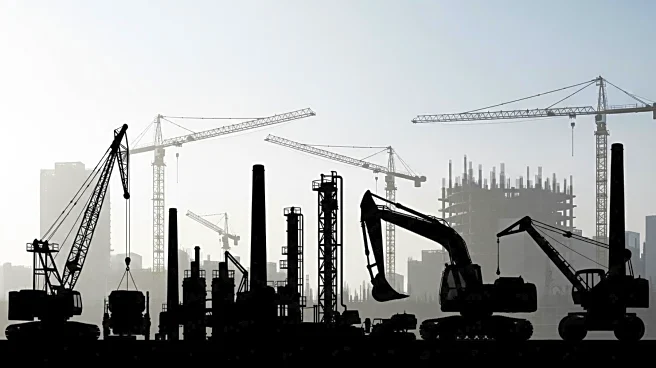What is the story about?
What's Happening?
The Albanian manufacturing sector is experiencing a downturn, as indicated by recent data for the period of April to June 2025. The industry, which includes extractive and processing activities, saw a 6.2% decrease in net sales volume and a 0.5% contraction in production compared to the same period last year. Employment in the sector also fell by 3.2%, although the wage bill increased by 4.5%. This decline is attributed to lower demand in key export markets, exchange rate losses, and rising domestic costs. In contrast, the construction sector is witnessing growth, with net sales increasing by 5.2%, production by 4.8%, and employment by 3.6%. The wage bill in construction rose significantly by 16.1%, driven by high demand for housing, public infrastructure projects, and foreign investment in real estate.
Why It's Important?
The contrasting trends in Albania's manufacturing and construction sectors highlight significant shifts in the country's economic landscape. The decline in manufacturing could have broader implications for Albania's export economy and labor market, potentially affecting economic stability and growth. Conversely, the growth in construction suggests a robust demand for housing and infrastructure, which could attract further foreign investment and stimulate economic activity. This divergence underscores the need for strategic economic planning to balance these sectors and mitigate potential negative impacts on the workforce and export revenues.
What's Next?
As the manufacturing sector continues to face challenges, stakeholders may need to explore strategies to boost competitiveness and adapt to changing market conditions. This could involve investing in technology, diversifying export markets, or enhancing workforce skills. Meanwhile, the construction sector's growth may prompt further investment in urban development and infrastructure, potentially leading to policy initiatives that support sustainable growth and address housing demands. Monitoring these trends will be crucial for policymakers and investors to ensure balanced economic development.
Beyond the Headlines
The decline in manufacturing and rise in construction may also reflect broader global economic trends, such as shifts in trade dynamics and urbanization. These changes could influence Albania's long-term economic strategy, emphasizing the importance of resilience and adaptability in its industrial policies. Additionally, the growth in real estate driven by foreign demand highlights the potential for Albania to position itself as an attractive destination for international investors, which could have lasting impacts on its economic and social fabric.















